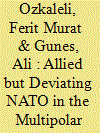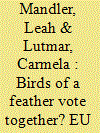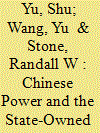| Srl | Item |
| 1 |
ID:
184667


|
|
|
|
|
| Summary/Abstract |
“How long can NATO last in a post-US hegemonic, multipolar world?” has become an important question in contemporary world politics. By statistically analyzing NATO alliance cohesion since its inception, this analysis contributes to the literature by developing an original set of indicators that rely on the ideal point estimates from a recent UN General Assembly voting dataset. It empirically verifies that NATO members have higher cohesion than other UN members, although the United States has been the most significant deviating member since 1980. The findings support some earlier proposals such as the external threat hypothesis. They also contradict some others, notably the literature on the Donald Trump administration’s withdrawal doctrine, and the decline of US hegemony and its policy implications. The article concludes that the future challenge for NATO cohesion not only would be the possibility of US abdication or abandonment, but also other members’ balancing the United States as the hegemon.
|
|
|
|
|
|
|
|
|
|
|
|
|
|
|
|
| 2 |
ID:
177571


|
|
|
|
|
| Summary/Abstract |
UN General Assembly (UNGA) voting is non-binding, unlike voting in the Security Council (UNSC), yet is considered to reflect states’ interests. This article attempts to explore, compare, and explain patterns in UNGA voting of two regional organisations (ROs) on Israel-related resolutions, and/or issues that are of importance to Israel. Israel has been a unique case when it comes to the UN, which has shown pervasive hostility towards the Jewish state over the past decades (e.g. 83 of the 97 UNGA resolutions criticising countries in 2012–15 [or 86%] were directed against Israel). While most researchers agree that ROs differ in the level of their group vote uniformity, this article argues that states’ voting on resolutions related to Israel also varies within ROs and over time. As such, it sheds light on internal changes within the examined ROs (the Arab League and the EU) and shows important differences among members of these organisations.
|
|
|
|
|
|
|
|
|
|
|
|
|
|
|
|
| 3 |
ID:
183780


|
|
|
|
|
| Summary/Abstract |
China has become a leading source of outward foreign direct investment (FDI), and the Chinese state exercises a unique degree of influence over its firms. We explore the patterns of political influence over FDI using a comprehensive firm-level data set on Chinese outward FDI from 2000 to 2013. Using six country-level measures of affinity for China, we find that state-owned and globally diversified firms appear to conform most closely to official guidance. Official investment directives and state visits link investments to state policies; Taiwan recognition and Dalai Lama meetings anchor our political interpretations; and UN General Assembly voting and temporary UN Security Council membership suggest that this intervention may be systematic. The results are robust to country, year, and sector fixed effects, and most do not hold for private or small firms. The results suggest that China uses FDI by prominent state-owned enterprises as an instrument to promote its foreign policy.
|
|
|
|
|
|
|
|
|
|
|
|
|
|
|
|